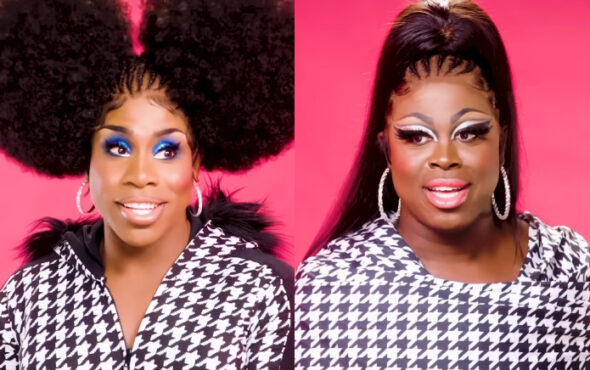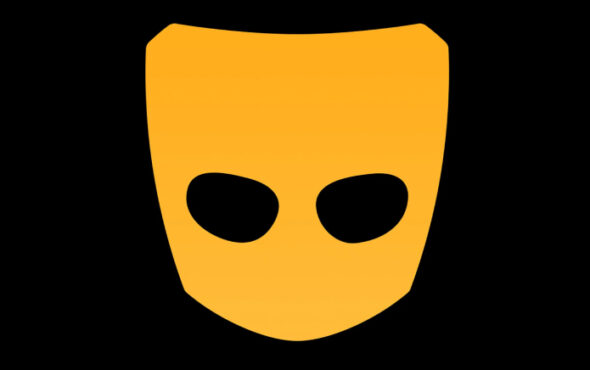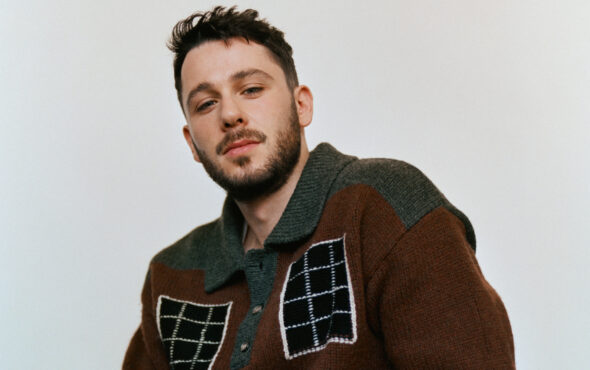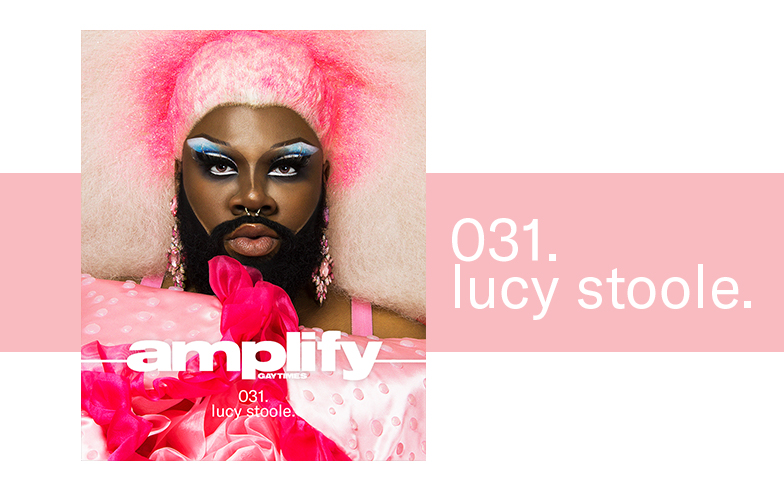
Pfft. Who needs an Emmy Award-winning reality competition to be a legend in the drag community? Lucy Stoole? Absolutely not.
The self-described “loud, outspoken sex-positive” performer has been a staple in the Chicago drag scene for the past 12 years and is notable for turning drag “on its head” with their unique brand of gender-fuckery.
“I would be considered the motherly figure of Chicago drag right now,” they tell us. As a bearded queen, Lucy has received their fair share of stigma, but they tell us it helped them discover their non-binary and gender nonconforming identity: “It opened up the doors for me in so many ways to not only have myself see things from a different standpoint, but to also help other people look at gender differently.”
Here, Lucy discusses their drag journey, why they won’t appear on Drag Race anytime soon, and why it’s important in this current political climate to be an outspoken activist.
How would you describe Lucy Stoole?
When I first meet people, I say Lucy Stoole is a combination of Lucille Ball, Divine and Grace Jones, a lot of the glamorous mixed up with the filth. I’m a jack-of-all-trades. More than anything, I would be considered the motherly figure of Chicago drag right now. I’m very inspired by the women in my life, they’ve taught me to be the person that I am today; to be bold and stand up for myself and for others, and to be outspoken and sexy.
How did you get into the world of drag?
I was a theatre major in college and I got kind of jaded and weirded out by the whole acting scene. It was a little too much for me at the time, so I ended up pulling away from it. It wasn’t until I moved to Chicago, about 12 years ago, that I started to get back into theatre and was looking for a way to get the acting bug out of me. A good friend introduced me to drag and that was the end of that.
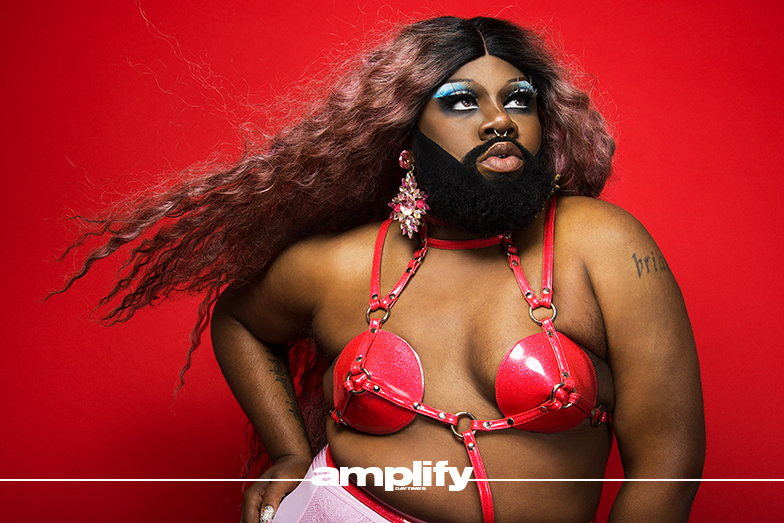
For you, what is in the power of drag?
Oh, wow! There are many layers to that, but the power for me definitely comes from how powerful I feel as Lucy. I’ve spent a lot of time in my life trying to hide who I was and Lucy was the first time that I was ever boldly, embracing me, ‘This is who I am and this is what I want to do.’ So Lucy has definitely inspired me to take a lot of that from my drag persona into my real life.
You’re a bearded queen – have you faced any stigma for that?
Oh yeah, absolutely. When I started out in the Chicago drag community six years ago it was completely different. It was a city overrun by pageant queens, which isn’t a bad thing in my book, but as we’ve seen throughout the ages, they can also be some of the meanest girls on the block. There was a lot of pushback on the scene because Chicago wasn’t as inclusive and diverse when it came to drag. People were really turned off by the sight of this “bearded lady” coming in, trying to perform and be seen on the same stage. I definitely fought back against that, but I also started out by performing in punk clubs and all the other dirty, dusty spots on the west side of town instead of in the queer neighbourhood.
Would you say attitudes towards bearded queens have changed in recent years?
Absolutely, especially in Chicago. I can’t speak for the rest of the country, but I know that from a lot of the places that I’ve visited and the people that support me. For Chicago specifically, I have seen the work that has been done by community members, including myself, to help it become a place like that. It’s pretty magical, it’s so supportive and we have a drag scene where girls aren’t fighting over gigs, or trying to put each other down because everyone feels like they have their own spot.
What do you think you symbolise as a bearded queen?
It’s definitely gender-fuckery to me. One of the reasons why I started doing it was because I was questioning what my gender identity was and how drag tied into that, which led to me becoming a gender nonconforming, non-binary person. It opened up doors for me in so many ways to not only have myself see things from a different standpoint, but to also help other people look at gender differently and turn it on its head, and think about stuff in ways they might not have. Also to remember that women have hair. To say that what I’m doing is not womanly or giving enough of an illusion is ridiculous, because I know many women with hair and moustaches.
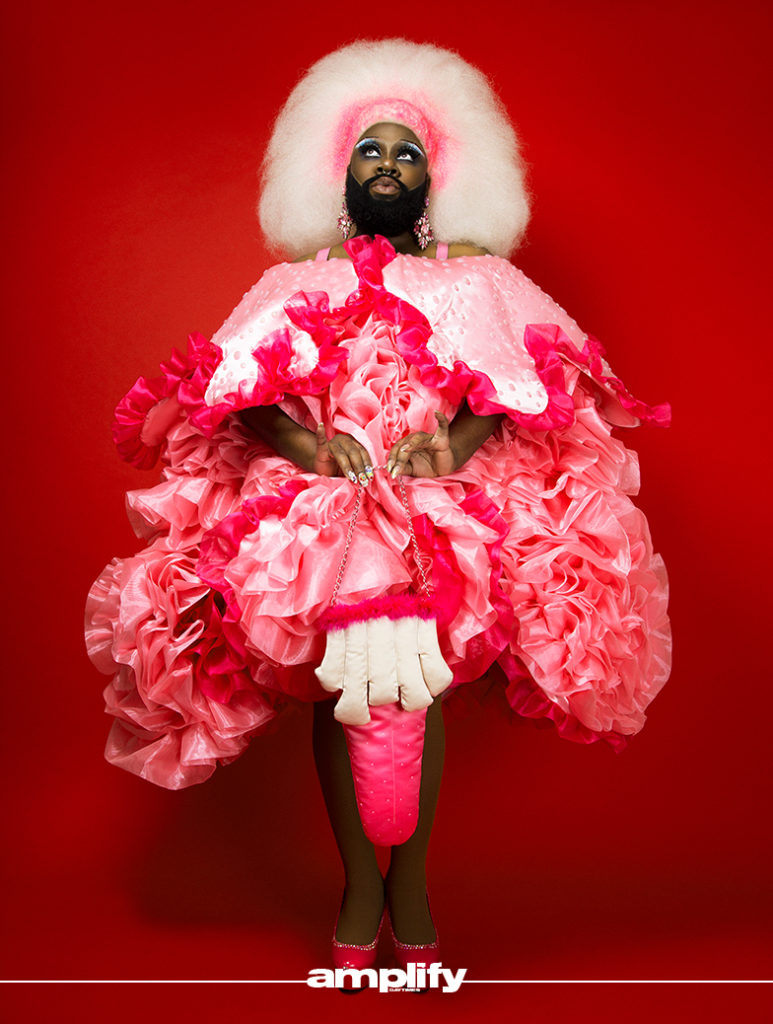
How long into your drag journey did you come to terms with your non-binary identity?
It took me a long time to really learn about what it meant to be gender nonconforming and non-binary. I’ve always been a person that didn’t want to seem hypocritical, so I didn’t want to co-opt a label or start using something without really knowing what I was going into, or what it exactly meant. I’ve been able to grow and learn from a lot of people inside the community and it’s led to a lot of discoveries about myself and hopefully helped other people do the same.
Have you faced discrimination in the drag scene for being non-binary?
I think it’s become a lot more inclusive of non-binary and gender nonconforming people, AFAB and AMAB queens, but I still think there’s a lot more time to go with it. I think that sometimes, for non-binary and gender nonconforming people, they get lost in the mix. People will look at it as, ‘Oh, this person is confused, they don’t know what’s going on.’ Actually, we know what’s going on. It’s good because I felt like I didn’t have to take any sort of side in the situation and also, looking at it now, I don’t see sides to it anymore.
Has the current political climate in America made you want to become a visible role model?
Abso-freakin-lutely. It’s more important than ever that I’m standing up and being vocal and using this platform that I now have to do as much work as I can, try and help out the entire LGBTQ community in whatever way possible. I found out a long time ago that I am just a loud, outspoken bitch and I’m always going to be the one that’s popping off and standing up for something. I take it as my responsibility to continue doing that. There’s so many people across the world that don’t have a platform, or don’t feel like they have a voice, so I feel like it’s even more important that I use mine to do that.
You grew up in Kansas, which is quite conservative – how was your childhood?
It was pretty tough, Kansas City is a former slave state, so I grew up in a pretty segregated community. On top of being this black person, I was also queer and a little fat kid. The one good thing about that, to this day, is that I’ve always been a positive person at heart. No matter what was thrown at me, I’ve always been able to overcome it in some way.
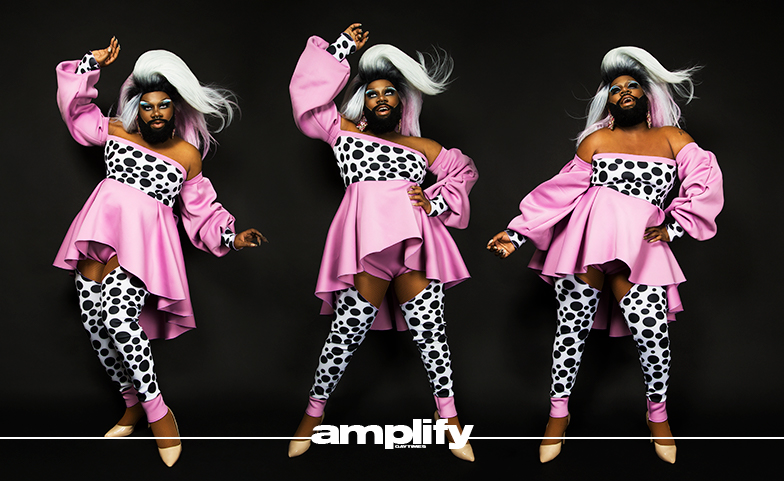
What were the attitudes of your friends and family like?
Oh my god, everyone hated it. I had a couple good friends growing up that I’m still good friends with now and they were supportive of me my entire life. And thank god for my grandmother, who raised me most of my life and was very accepting of the little weird boy I was, and the little weird person that I’ve become now. She really made it possible for me to feel comfortable in myself, so I’ve always had someone on my side – and she still is that person to that today.
Would you say the art of drag has helped you to become more body positive?
Absolutely. I’ve been a fat person my entire life, and I spent so many years being ashamed and hating myself. Even from my mother and other people, I was taught to dislike my body in so many different ways. It wasn’t until I did drag that I started to feel sexy and voluptuous and see myself in a different light, both in and out of drag.
As a queen who has not been on Drag Race, what is it like working in the scene?
Oh honey, it’s an issue for every performer in the scene that hasn’t been on the television. That being said, I’m also blessed to have gotten to the point where I am because I am doing a lot better than a lot of people who have been working just as long, or if not longer than me. So I definitely won’t sit here and not say that I’m reaping some great rewards at the moment, but even still, I believe that a lot of us deserve a lot more than what we’re given. It can be somewhat hurtful to see someone come into a club that isn’t a part of it, isn’t necessarily doing the work that you’ve been doing in your community for a long time, and see them get paid $1000-$5000 while you walk away with $100. But everybody started off at that point too, so I try not to base where I’m at off of somebody else because it would end up messing you up in the long run and not helping anything. But there is a huge discrepancy between the local girls and what the other girls are getting on TV.
Has this ever inspired you to audition for the show? Or is it not for you?
I’ve gotten kind of close a few times, this year was probably the closest. I started a tape, but there’s always something that stops me. A few years ago, I wasn’t necessarily ready. While I do feel like I am a fantastic performer and someone who could compete with the girls, I don’t know how I would be seen through that lens, so it’s hard for me to think about going into that situation. I’m just really outspoken, sex-positive and so many things that I’m not sure would work through the RuPaul lens.
You can follow Lucy Stoole on Instagram here.
Photography Adam Ouahmane
Words Sam Damshenas
Hair and makeup Lucy Stoole

